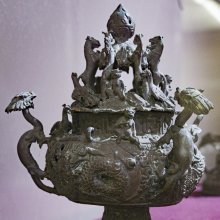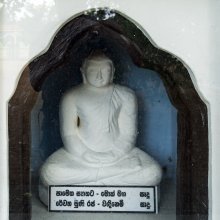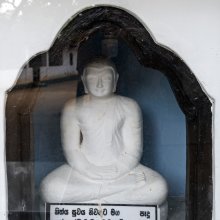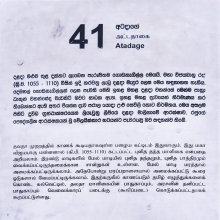Maka: 14 definitions
Introduction:
Maka means something in Hinduism, Sanskrit, the history of ancient India, Marathi, biology, Tamil. If you want to know the exact meaning, history, etymology or English translation of this term then check out the descriptions on this page. Add your comment or reference to a book if you want to contribute to this summary article.
Images (photo gallery)
(+4 more images available)
In Hinduism
Ayurveda (science of life)
Nighantu (Synonyms and Characteristics of Drugs and technical terms)
Source: WorldCat: Rāj nighaṇṭuMaka in the Marathi language is another name for Mārkava, a medicinal plant identified with two varieties viz., Eclipta prostrata L. and Sphagneticola calendulacea, both from the Asteraceae or “aster” family of flowering plants, according to verse 4.138-141 of the 13th-century Raj Nighantu or Rājanighaṇṭu. The fourth chapter (śatāhvādi-varga) of this book enumerates eighty varieties of small plants (pṛthu-kṣupa). Other than the Marathi word Maka, there are more synonyms identified for this plant among which twenty are in Sanskrit.
Unclassified Ayurveda definitions
Source: Advances in Zoology and Botany: Ethnomedicinal List of Plants Treating Fever in Ahmednagar District of Maharashtra, IndiaMākā in the Marathi language refers to the medicinal herb “Eclipta alba Hassk. Syn. Eclipta prostrata Roxb.”, and is used for ethnomedicine treatment of Fever in Ahmednagar district, India. The parts used are: “Whole plant”. Instructions for using the herb named Mākā: The fresh juice of leaves 10 ml added in a glass of milk along with the rock sugar—twice a day.

Āyurveda (आयुर्वेद, ayurveda) is a branch of Indian science dealing with medicine, herbalism, taxology, anatomy, surgery, alchemy and related topics. Traditional practice of Āyurveda in ancient India dates back to at least the first millenium BC. Literature is commonly written in Sanskrit using various poetic metres.
India history and geography
Source: academia.edu: The Chronology of Ancient Gandhara and BactriaMaka or Maga: We can accurately identify the area of the Indo-Greek King Maga or Maka because the area of western Bactria, western Tajikistan, eastern Tukmenistan and eastern Uzbekistan was well-known as the country of Maka. Most probably, the first Indo-Greek King of this area had a title of Soter Megas (ΣΩΤΗΡ ΜΕΓΑΣ) which is evident from the numismatic evidence. The descendants of Indo-Greek King Soter Megas also had the same title. Therefore, they were generally referred to as Maga or Maka kings. Gradually, the country of Maga kings also came be known as Maga. Since Zoroaster was born in this Maka kingdom, Zoroastrianism also came to be known as Maghism.
Source: academia.edu: The Yona or Yavana Kings of the time of the Legendary King AshokaMaka was an Indo-Parthian king who established his kingdom in Turkmenistan and Bactrian region during the time of Ashoka. Later, the kingdom of the descendants of Maka came to be known as Maka or Maga. Since Zoroaster was born in this Maka kingdom, therefore, Zoroastrianism was also called Magism.
Source: Ancient Buddhist Texts: Geography of Early BuddhismMaka (मक) or Maga is another name for Magas (king of Cyrene in North Africa), with whom Asoka maintained a friendly relation.—Asoka maintained friendly relations not only with Ceylon and the Tāmil powers of the South but also with kings of countries outside India. They were Antiochus Theos, King of Syria and western India (Aṃtiyako Yonarājā), and even with the kings and neighbours to the north of the kingdom of Antiochus where dwelt four kings named severally Ptolemy (Turamayo), Antigonos (Aṃtikini), Magas (Maga or Maka), and Alexander (Alikasudara). Ptolemy Philadelphos was King of Egypt, Magas was King of Cyrene in North Africa, Antigonos Gonatas was King of Macedonia, and Alexander was King of Epirus (Rock Edict XIII).

The history of India traces the identification of countries, villages, towns and other regions of India, as well as mythology, zoology, royal dynasties, rulers, tribes, local festivities and traditions and regional languages. Ancient India enjoyed religious freedom and encourages the path of Dharma, a concept common to Buddhism, Hinduism, and Jainism.
Biology (plants and animals)
Source: Wisdom Library: Local Names of Plants and DrugsMaka [माका] in the Marathi language is the name of a plant identified with Caesulia axillaris Roxb. from the Asteraceae (Sunflower) family having the following synonyms: Meyera orientalis. For the possible medicinal usage of maka, you can check this page for potential sources and references, although be aware that any some or none of the side-effects may not be mentioned here, wether they be harmful or beneficial to health.
Source: Google Books: CRC World Dictionary (Regional names)1) Maka in India is the name of a plant defined with Cotula alba in various botanical sources. This page contains potential references in Ayurveda, modern medicine, and other folk traditions or local practices It has the synonym Eupatoriophalacron album (L.) Hitchc. (among others).
2) Maka is also identified with Eclipta alba It has the synonym Bellis ramosa Jacq. (etc.).
3) Maka is also identified with Eclipta prostrata It has the synonym Aspilia mossambicensis (Oliv.) Wild (etc.).
4) Maka is also identified with Zea mays It has the synonym Zea mays var. pennsylvanica Bonaf. (etc.).
5) Maka in Ivory Coast is also identified with Setaria megaphylla.
6) Maka in Nigeria is also identified with Pennisetum glaucum It has the synonym Panicum compressum Balb. ex Steud. (etc.).
Example references for further research on medicinal uses or toxicity (see latin names for full list):
· Feddes Repert. (1973)
· Breeding Science (1995)
· Amer. Journal of Botany
· Synopseos Plantarum (1805)
· A Manual of Botany for the Northern States (1818)
· Journal of Cytology and Genetics (1996)
If you are looking for specific details regarding Maka, for example diet and recipes, pregnancy safety, extract dosage, health benefits, side effects, chemical composition, have a look at these references.

This sections includes definitions from the five kingdoms of living things: Animals, Plants, Fungi, Protists and Monera. It will include both the official binomial nomenclature (scientific names usually in Latin) as well as regional spellings and variants.
Languages of India and abroad
Marathi-English dictionary
Source: DDSA: The Molesworth Marathi and English Dictionarymakā (मका).—f m Indian corn, Zea Mays.
--- OR ---
mākā (माका).—m (mārkava S) A shrub, Verbesina scandens, or, according to Graham, Eclypta prostrata.
Source: DDSA: The Aryabhusan school dictionary, Marathi-Englishmakā (मका).—f m Indian corn (Maize.)
Marathi is an Indo-European language having over 70 million native speakers people in (predominantly) Maharashtra India. Marathi, like many other Indo-Aryan languages, evolved from early forms of Prakrit, which itself is a subset of Sanskrit, one of the most ancient languages of the world.
Sanskrit dictionary
Source: Cologne Digital Sanskrit Dictionaries: Monier-Williams Sanskrit-English Dictionary1) Maka (मक):—mn. [gana] ardharcādi
2) m. m. the son of a Vaiśya and a Mālukī, [cf. Lexicographers, esp. such as amarasiṃha, halāyudha, hemacandra, etc.]
[Sanskrit to German]
Sanskrit, also spelled संस्कृतम् (saṃskṛtam), is an ancient language of India commonly seen as the grandmother of the Indo-European language family (even English!). Closely allied with Prakrit and Pali, Sanskrit is more exhaustive in both grammar and terms and has the most extensive collection of literature in the world, greatly surpassing its sister-languages Greek and Latin.
Kannada-English dictionary
Source: Alar: Kannada-English corpusMaka (ಮಕ):—
1) [noun] (rightly, ಮುಖ [mukha]) the front part of the head, from the forehead to the chin; the face.
2) [noun] the mouth.
3) [noun] the point toward which something faces; direction.
4) [noun] the place or position directly before a person or thing; front.
5) [noun] confidence in oneself, one’s own abilities, etc.; self-confidence.
6) [noun] the act or an instance of beginning; commencement.
7) [noun] the front portion of anything.
Kannada is a Dravidian language (as opposed to the Indo-European language family) mainly spoken in the southwestern region of India.
Tamil dictionary
Source: DDSA: University of Madras: Tamil LexiconMaka (மக) noun [K. maga.]
1. Child, infant; young of an animal; பிள்ளை. மந்திம்மக [pillai. manthimmaga] (சீவகசிந்தாமணி [sivagasindamani] 1897).
2. Son or daughter; மகன் அல்லது மகள். மகமுறை தடுப்ப [magan allathu magal. magamurai thaduppa] (பத்துப்பாட்டு: மலை [pathuppattu: malai] 185).
3. Young age; இளமை. (யாழ்ப்பாணத்து மானிப்பாயகராதி) [ilamai. (yazhppanathu manippayagarathi)]
--- OR ---
Maka (மக) noun An ancient land tax. See மகமை [magamai], 3. (யாழ்ப்பாணத்து மானிப்பாயகராதி [yazhppanathu manippayagarathi])
--- OR ---
Makā (மகா) adjectival < mahat.
1. Great, high, exalted, dignified, noble, honourable; பெருமை யான. மகாசபையோம் [perumai yana. magasapaiyom] (S. I. I. i, 68).
2. Immense, prodigious, stupendous, monstrous, extreme; அளவற்ற. [alavarra.]
3. Superior, paramount, superlative; உயர்ந்த. [uyarntha.]
4. Intense; மிகுந்த. [miguntha.]
Tamil is an ancient language of India from the Dravidian family spoken by roughly 250 million people mainly in southern India and Sri Lanka.
See also (Relevant definitions)
Starts with (+602): Maka makna, Maka no, Maka saka, Maka saka thata i, Maka skithe, Maka-canacurottiriyam, Maka-catikal, Maka-civarattiri, Maka-cuvacarokam, Maka-kanarokam, Maka-mantiramurttikal, Maka-mayacakti, Maka-meka-racankatailam, Maka-merupiracamcai, Maka-merutanam, Maka-miruttuyancayam, Maka-nimpam, Maka-pancamulam, Maka-paratavirutti, Maka-patumapentam.
Ends with (+785): Abhasatmaka, Abhavatmaka, Abhimanatmaka, Abhinayatmaka, Abhitatmaka, Abhivrityatmaka, Abhyantarimaka, Abhyasatmaka, Acamaka, Acammaka, Acarimaka, Acarmaka, Accutagamabyamaka, Achamaka, Adalitatmaka, Adantadamaka, Adhigamaka, Adhikarmmaka, Adhumaka, Adhyakshatmaka.
Full-text (+531): Maga, Magu, Makadatta, Makappal, Makapiratani, Makativu, Makamayi, Makalopi, Makaticai, Alomaka, Makatanpanai, Maka-pancamulam, Makavurpalam, Makavicumpan, Makavenu, Bhavasara, Makatorai, Makavirukati, Makayocanai, Makapurutan.
Relevant text
Search found 23 books and stories containing Maka, Makā, Mākā, Maga, Magaa; (plurals include: Makas, Makās, Mākās, Magas, Magaas). You can also click to the full overview containing English textual excerpts. Below are direct links for the most relevant articles:
Vedic influence on the Sun-worship in the Puranas (by Goswami Mitali)
Part 8 - Mode of Worship < [Chapter 4 - Vedic Influence on the Sun-Worship in the Purāṇas]
Part 10 - Growth of the Purāṇic Texts for Propitiating the Sun-god < [Chapter 3 - General Characteristics of the Purāṇic Religion and its Link with the Vedic Tradition]
Part 10 - Temples and Pilgrimages for Worshipping the Sun-god in the Purāṇas < [Chapter 4 - Vedic Influence on the Sun-Worship in the Purāṇas]
Manusmriti with the Commentary of Medhatithi (by Ganganatha Jha)
Verse 1.74 < [Section XLIII - Brahmā creates the Mind and applies it to creation]
Settlement in Early Historic Ganga Plain (by Chirantani Das)
Part 16 - Vārāṇasī from proto historic to historic context < [Chapter VI - Vārāṇasī: Emergence of the Urban Centre and Seat of Administration]
The Vishnu Purana (by Horace Hayman Wilson)
9. The Bhaviṣya Purāṇa < [Preface]
The Agni Purana (by N. Gangadharan)
The Religion and Philosophy of Tevaram (Thevaram) (by M. A. Dorai Rangaswamy)
Chapter 67 - Thiruvottiyur or Tiruvorriyur (Hymn 54) < [Volume 3.6 - Pilgrim’s progress: away from Otriyur and Cankili]
Chapter 1.3 - Umabhaga-murti (depiction of the Mother Goddess) < [Volume 2 - Nampi Arurar and Mythology]
Related products








